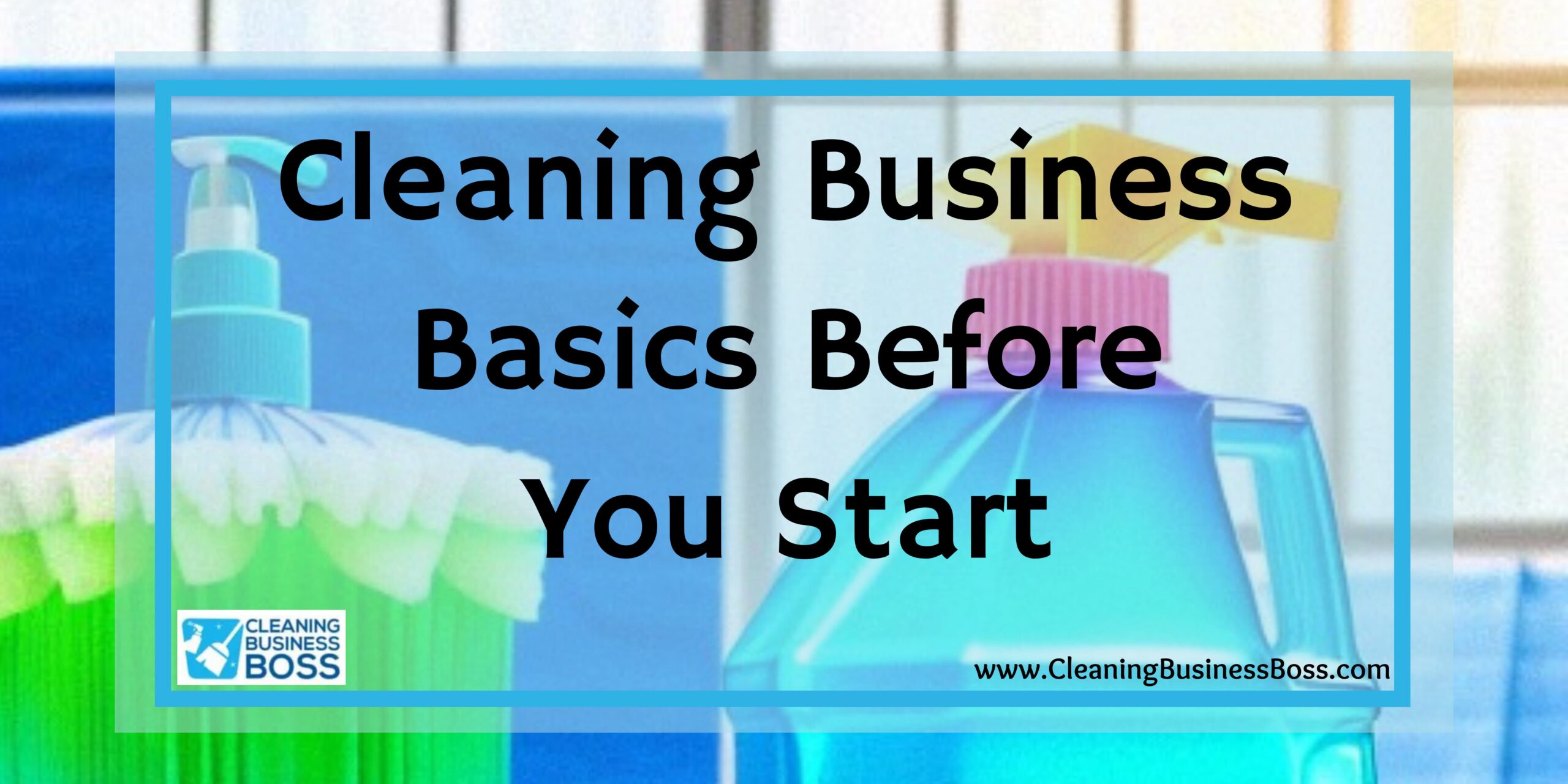There are a few important decisions you will have to make before starting your new cleaning business. These are essential steps that will lay the foundation for your business.
How you create and manage these basics will determine how smoothly your cleaning business will run. It will give your business direction, help you draw up an operations plan, and complete other essential matters. There are many things to take care of — from the name to the finances and legal issues — before your business is ready to go.
Naming your company
You want a spectacular brand name that creates a good impression in your customers’ minds. Whether you’re playing with popular phrases, using catchy rhymes, or sticking with something simple, you want your clients to see a hard-working, dedicated cleaning company. Your name must mirror your style and the services you provide, so keep it true to your business.
Follow the following steps when naming your business;
Keep the name concise.
Don’t confuse prospective clients with a lengthy title that explains every single service you provide. Also, you should avoid using too many sweet terms; it makes the name become boring. You should give a short description and include phrases like “cleaning company” in the title. However, you don’t have to go into each specific service that you offer.
Your name should be easy to spell.

If you want clients to find your business online easily, then you should consider a name that’s easy to spell. Clients should be able to type your company’s name in search engines without having to navigate misspellings. It makes things easier for them.
Avoid any negative connotations in your name.
Note that your business name will send the first impression to your prospective clients. So, it is vital that you attract customers, not repel them. Keep it positive and away from any degrading slurs. The name must be spectacular and be able to stand out in your customers’ minds.
Avoid “cutesy” names if possible.
If your target customer-base is majorly commercial clients, then you want to stay away from anything too cutesy in your name. Such clients will be searching for a professional, hard-working cleaning company; and although you are competent, the unprofessional name will drive them away. How do you, then, get a name that fits the above standards? I’ll be showing you the answer to this question below.
Brainstorming Session
Sit down with a paper and a pen and jot down every idea that comes to mind, no matter how awful your ideas may sound. This will make your creative ideas flow, and you may end up with a fantastic name amid all the horrible ones.
Try it out.
Run your name by a couple of friends and family to see what their responses or opinions are. If you’re not comfortable with just one name yet, pick some of your favorites and ask for their opinions on which one you should go with.
Look up the name.
The next thing that you want to do is to confirm that another cleaning business has not taken your name. You can do this online by checking the U.S. Patent and Trademark Office (USPTO).
Some business owners may decide to use their personal names in their business’s name. But be mindful that this can make reselling a little more complicated in the future! The company becomes personalized if your name is included in it. Potential buyers will not be interested because they don’t share your first name.
If you intend to resell in the future, keep that in mind while creating your business name. Think of something that would draw buyers, just as customers should be attracted to use your services.
Check out this article for the steps needed in starting your cleaning business.
Licenses

You need to verify what the requirements are in your state and your local area. Typically, a company license is required for identification and tax purposes. Find out what local requirements may relate to your cleaning business and follow through so that no related problems can occur in the future. You may need to pay some fees before obtaining your license, so keep this in mind as you plan to finance and budget.
Insurance
Because your company includes operating on someone else’s property, business liability insurance will be a smart investment to you.
There is always a risk of damaging a customer’s property, falling from a ladder, accusation of theft, and a significant number of possible lawsuits. Without proper insurance, you run the risk of costly legal fees that might ruin your new business. Don’t put yourself in a situation like this. Instead start preparing ahead of time and address the problems before they arise.
Many commercial customers even demand you have insurance before they can your company, as they do not want the trouble of having to deal with a non-insured business in any of the above scenarios. You are covered by Liability insurance in the event of property damage or personal injury, both of which are a common risk in the cleaning industry.
Annually, the insurance cost is about the amount you would otherwise pay in a lawsuit or damages. This not only covers you and your business, but it also covers your employees’ risk.
Legal issues
Starting a cleaning business, compared to other small businesses, involves many unique legal issues. You’ll be working in people’s homes and on their property, as mentioned above, so this puts you in a different situation than many other businesses operating from their own property. There are a few crucial things you’ll need to bear in mind that have not yet been addressed:
Health and safety
Confirm with the occupational safety and health Administration ( OSHA) what their regulations are for your new business.
They issue numerous regulations concerning protection, safety, the health of employees, working with hazardous materials, and a number of other regulations that may be relevant to your business.
Failure to meet those standards may result in legal implications concerning the safety of your business activities. It shouldn’t take long to go through a list to see where you are with the rules. This will help you prevent any future issues.
Policies
You can choose whether to place your customer policies on your website; however, you must assume that not all customers will have access to your website or choose to go there.
Before agreeing to clean for a client, provide a printed copy of your policies so that they can have a better understanding of what to expect from your business.
This covers areas such as: who will buy cleaning products, specifications for the provided workspace (heating, cooling, ventilation), rules on the operation of the customer’s belongings (washing machines, dryers, dishwashers), customer’s privacy, and other relevant things.
Contracts
When you sign up for a periodic cleaning service with a commercial client, a contract can help you make sure you get paid and keep many legal issues from arising.
This is also applicable to homeowners and smaller clients, but is mainly suggested for larger clients who will need your service for more than a year. The contract should specify the policies mentioned above and how they relate to the business relationship between you and the client.
If either of you violates the policies set out above, decide how this impacts or ends the contract.
Employees
You must conduct a background check on all your employees to see their history and make sure they are not hiding anything that might be implicative in a lawsuit. Clients will allow your staff into their homes and companies based on your word, so you have to be sure that they are trustworthy. However, you should not violate privacy laws while doing this. Also, you shouldn’t ask questions that are legally prohibited.
Take the time to look at the employee requirements for your industry — such as the minimum wage — the documents required, and the classification for your staff. On the other hand, make sure you treat your employees fairly and legally.
Evaluate the minimum wage, look at the benefits for full-time employees, and stay loyal to the promises you give them on wages and hours. Being fair to your employees and complying with the law will keep your business away from a nasty lawsuit.
Do you think is it legal to clean houses for cash? Check out this article to know the answer.
Startup funds

How are you going to finance your cleaning business? There are a lot of things to be covered financially, and it will take some time before you start to make a profit. So you can’t afford to slack in this area.
Take time to consider everything that needs to be paid for, right from the start of your business. You don’t have to rush this so as not to omit the important things. Besides, it’s advisable to make consultations. Consider the following;
- Equipment
- Insurance
- Business license
- Rent
- Marketing
- Wages
- Logistics
- etc.…
If you’re starting this new business on your own, then it’s safe to assume that you can’t cover all of these costs with your own money. If that is the case, then the good news is that you have a number of options that you can explore.
- Loans and grants
- Crowdfunding
- Family and friends
- Bootstrapping
A little research will help you determine which one is best for you. Everything mentioned above is important in building your new cleaning business. They will help you start your business on the right note.
To learn more on how to start your own cleaning business, check out my startup documents here.
Please note that the contents of this blog are for informational and entertainment purposes only and should not be construed as legal advice. Any action taken based on the information provided in this blog is solely at your own risk. Additionally, all images used in this blog are generated under the CC0 license of Creative Commons, which means they are free to use for any purpose without attribution.

About the author. Entrepreneur and Cleaning Business Fan.
Hi! I am Shawn and I am a happy individual who happens to be an entrepreneur. I have owned several types of businesses in my life from a coffee shop to an import and export business to an online review business plus a few more and now I create online cleaning business resources for those interested in starting new ventures. It’s demanding work but I love it. I do it for those passionate about their business and their goals. That’s why when I meet a cleaning business owner, I see myself. I know how hard the struggle is to retain clients, find good employees and keep the business growing all while trying to stay competitive.
That’s why I created Cleaning Business Boss: I want to help cleaning business owners like you build a thriving business that brings you endless joy and supports your ideal lifestyle.



1 thought on “Cleaning Business Basics Before You Start”
Comments are closed.